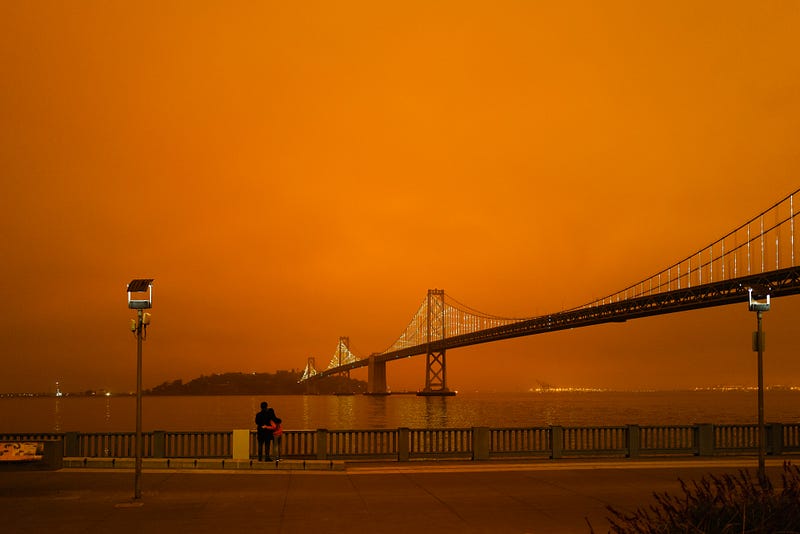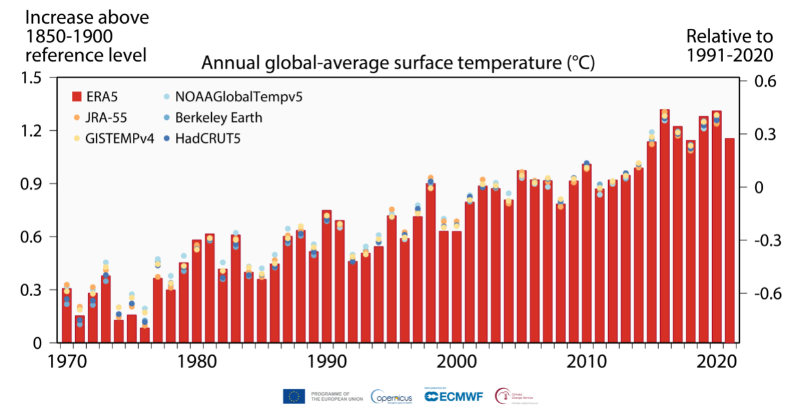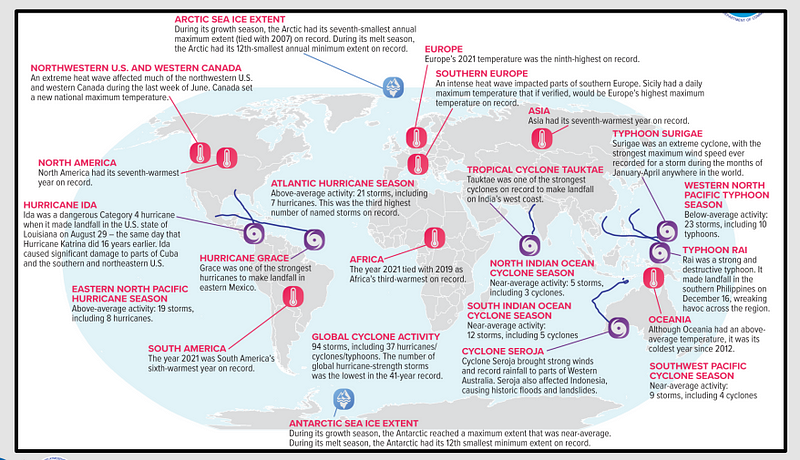Climate Catastrophe: An Urgent Call to Action on Climate Change
Written on
Chapter 1: The Current State of the Climate Crisis
Recent scientific findings reaffirm that humanity is on a perilous path, and without a monumental collective effort—which seems unlikely—we are facing dire consequences.
Despite the overwhelming impact of COVID-19, which has tragically claimed over 5.5 million lives globally, climate change remains an ever-looming threat. While attention shifted towards the pandemic, the pressing environmental issues did not vanish; they have merely been overshadowed.
These will be the most manageable years of our lives.

Photo by Thom Milkovic on Unsplash
Major climate monitoring organizations marked 2021 as yet another year of alarming data. The European Union’s Copernicus Climate Change Service designated it the seventh hottest year on record, with the six hottest years all occurring since 2014. Similarly, the Tokyo Climate Center reported 2021 as the sixth hottest year since records began, with all five preceding years also being recent. NASA and NOAA in the United States echoed these findings, labeling 2021 as the sixth hottest year overall. Notably, 2021 set a record for the hottest La Niña year, a climate phenomenon usually associated with cooler global temperatures—yet this year did not escape the heat.
Let’s be clear: these are not records we should celebrate. Moreover, this is likely the coolest it will be for the rest of the century. We are only beginning to feel the heat.
It’s becoming costly—U.S. weather disasters in 2021.

NOAA
The financial and human toll is escalating. In the United States alone, 2021 experienced twenty weather-related disasters, each costing over a billion dollars, marking the second-highest total after 2020. However, the overall cost reached $145 billion—up from $105 billion the previous year—indicating that while fewer disasters occurred, they were significantly more devastating. These catastrophic events included wildfires, droughts, tornadoes, and a $24 billion winter storm, which collectively claimed at least 668 lives—more than double the fatalities in 2020.
But we had the COP26 climate conference, so everything must be fine, right?
That’s a hopeful misconception. Yes, the climate conference took place in Glasgow, complete with heartfelt speeches and commitments. Yet, like its twenty-five predecessors, COP26 is unlikely to alter the trajectory of climate disaster. Greenhouse gas emissions continue to climb at an alarming rate, and now we must also contend with methane.
To avert a civilization-threatening temperature rise of over 1.5°C from preindustrial levels, we must drastically reduce greenhouse gas emissions. Alarmingly, after twenty-six years since COP1, carbon dioxide levels in the atmosphere have reached a staggering 419 ppm—the highest in 4.5 million years.
The last time CO2 concentrations were this elevated, lush forests thrived near the South Pole.
The alarming trend of methane emissions

Copernicus Climate Change Service
Adding to the urgency, methane—an even more potent greenhouse gas—has been rising rapidly. Over the initial twenty years after its release, methane is 84 times more effective at trapping heat than CO2. The spike in methane levels remains poorly understood, with multiple potential sources ranging from oil and gas operations to natural phenomena like wetlands and thawing permafrost.
The amount of methane trapped in the Arctic is staggering, with estimates suggesting that permafrost alone contains around 1.5 trillion metric tons of organic carbon—double the carbon present in the atmosphere.
While the consensus is that these greenhouse gases will be released gradually rather than causing immediate catastrophic warming, we are entering uncharted waters. A recent study uncovered unexpected methane releases from limestone deposits in the Arctic. Understanding this phenomenon, as lead author Nikolaus Froitzheim remarked, “may differentiate between catastrophe and apocalypse.”
I had hoped for at least one alternative option.

Copernicus Climate Change Service
None of this is encouraging.
The situation is dire. We are already experiencing significant global heating, but we still have the chance to prevent total collapse through a global, multi-trillion-dollar initiative aimed at decarbonizing our economies.
Unfortunately, you may not have heard of such an initiative, as it does not exist. Our so-called leaders are largely engaged in empty rhetoric rather than taking meaningful action. This is surprising given that even the most privileged communities are not safe from wildfires, floods, and soaring food prices; yet, it is perhaps unsurprising given the lack of understanding among many politicians.
Thus, the responsibility falls on us—the public—to advocate for change, to raise awareness, and to take the threat of climate collapse seriously.
Can we succeed? I don’t write these dire warnings with the intent of spreading hope; I’m not cut out for that role. Based on past experiences, it seems we are running out of time.
However, voting, advocating, and educating others are the tools at our disposal. We would be foolish not to wield them.
Related:
A Terrifying New Climate Report: Insights from COVID-19 on Our Response
The world reacts to real-time disasters with a mix of indignation, denial, and apathy.
Chapter 2: The Path Forward
This video titled "Apocalypse Now! Climate Change and Its Impact on the Practice of Psychiatry" explores the psychological effects of climate change and the urgency for action in the mental health field.
The video "We WILL Fix Climate Change!" presents innovative solutions and the potential for collective action to combat climate change, emphasizing the power of grassroots movements.